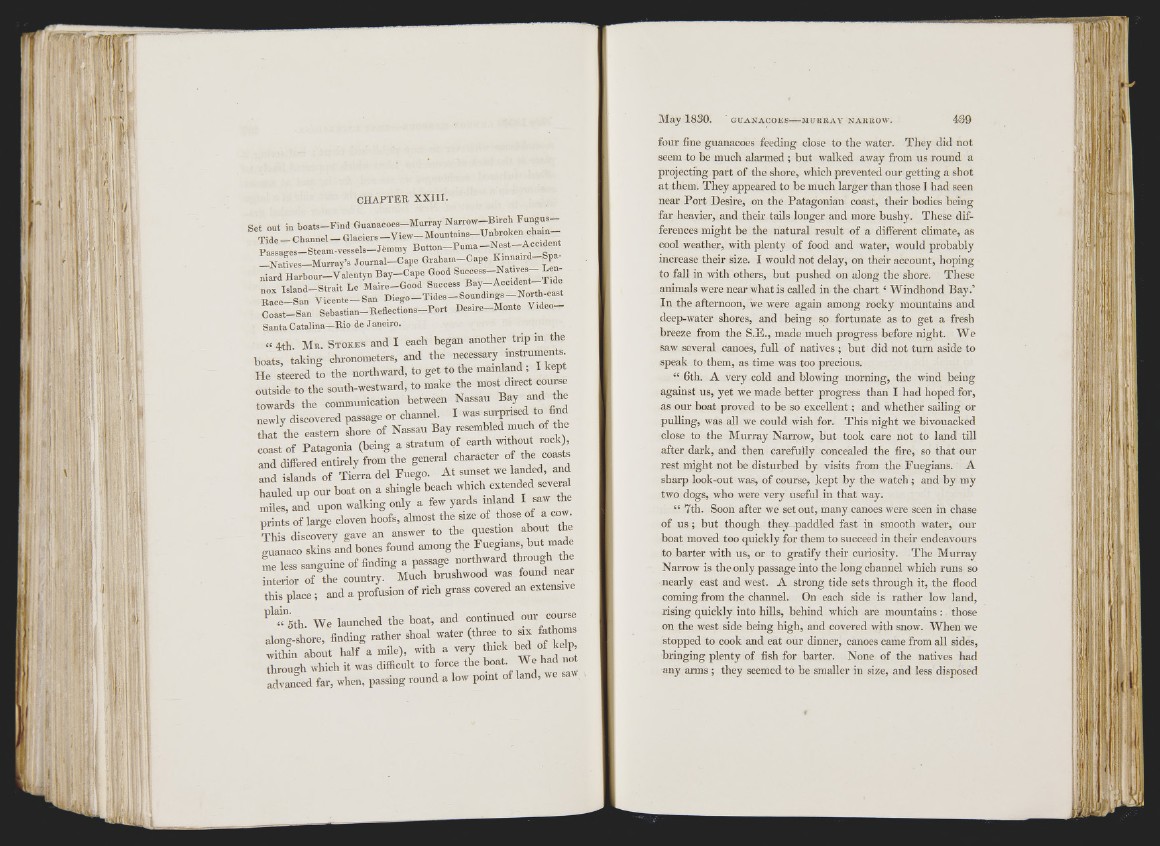
<r V
- ii
,!i=
7(- ! i-
CH A P T E R X X I I I .
Set out in b o a ts -F in d G n an ac o e s-M u rray N a n -ow -B irc h F u n g u s -
Tide - Channel - G laciers -V ie v v -M o u n tam s -U n b ro k™ c h ^ n
Passages—Steam-vessels—Jfeiumy Button Puma i es
-N a t iv e s -M u r r a y ’s Jo u rn a l-C a i.e G ra h am -C a p e R m n a ird -S p a -
niard H a rb o u r-V a le n ty n B a y -C a p e Good S u c c e s s - N a U v e s L nnox
I s la n d -S tr a i t Le M a ir e -G o o d Success B a y -A c c .d ^ t r id
R a c e -S a n V i c e n t e - S a n D i e g o -T i d e s - S o u n d m g s -N o r th east
L L t - S a n S e b a s tia n -R e fie c tio n s -P o rt D e s ir e -M o n te V id e o -
Santa C atalina—Rio de Janeiro.
“ 4th Mr. S t o k e s and I each began another trip in the
boats, taking chronometers, and the necessary instruments
He steered to the northward, to get to the mamland ; I kep
outside to the south-westward, to make ffie most direct cou se
towards the communication between Nassau Bay and the
newly discovered passage or channel. I was
that the eastern shore of Nassau Bay resembled much of die
coast of Patagonia (being a stratum of earth without lock
and differed entirely from the general character of t l j
and islands of Tierra del Fuego. At sunset we landed, and
hauled up our boat on a shingle beach which -ten d ed severd
miles, and upon walking only a few yards inland I saw the
prints of large cloven hoofs, almost the size of those of a cow
This discovery gave an answer to the question about the
guanaco skins and bones found among the F'^^gian®
me less sanguine of finding a passage northward through t! e
interior of the country. Much brushwood was found neat
this place ; and a profusion of rich grass covered an extensive
^^“"sth We launched the boat, and continued our course
along-shore, finding rather shoal water (three to six fathoms
witHn about half a mile), with a vety thick of kelp
through which it was difficult to force the boat. We had not
advanced far, when, passing round a low pomt of land, we saw
439
four fine guanacoes feeding close to the water. They did not
seem to be much alarmed ; but walked away from us round a
projecting part of the shore, which prevented our getting a shot
at them. They appeared to be much larger than those I had seen
near Port Desire, on the Patagonian coast, their bodies being
far heavier, and their tails longer and more bushy. Tliese differences
might be the natural result of a different climate, as
cool weather, with plenty of food and water, would probably
increase their size. I would not delay, on their account, hoping
to fall in with others, but pushed on along the shore. These
animals were near what is called in the chart ‘ Windhond Bay.’
In the afternoon, we were again among rocky mountains and
deep-water shores, and being so fortunate as to get a fresh
breeze from the S.F., made much progress before night. We
saw several canoes, full of natives ; but did not turn aside to
speak to them, as time was too precious.
“ 6th. A vei'y cold and blowing morning, the wind being
against us, yet we made better progress than I had hoped for,
as our boat proved to be so excellent; and whether sailing or
puUing, was all we could wish for. This night we bivouacked
close to the Murray Narrow, but took care not to land till
after dark, and then carefully concealed the fire, so that our
rest might not be disturbed by visits from the Fuegians. A
sharp look-out was, of course, kept by the watch ; and by my
two dogs, who were very useful in that way.
“ 7th. Soon after we set out, many canoes were seen in chase
of u s ; but though they paddled fast in smooth water, our
boat moved too quickly for them to succeed in their endeavours
to barter with us, or to gratify their curiosity. The Murray
Narrow is the only passage into the long channel which runs so
nearly east and west. A strong tide sets through it, the flood
coming from the channel. On each side is rather low land,
rising quickly into hills, behind which are mountains : those
on the west side being high, and covered with snow. When we
stopped to cook and eat our dinner, canoes came from all sides,
bringing plenty of fish for barter. None of the natives had
any arms ; they seemed to he smaller in size, and less disposed
i t " i
:J;ttolli to' t¡o11i 1l